ARE YOU SCAMWISE? Take our scams quiz and find out whether you can beat the scammers
1. Is this a scam?

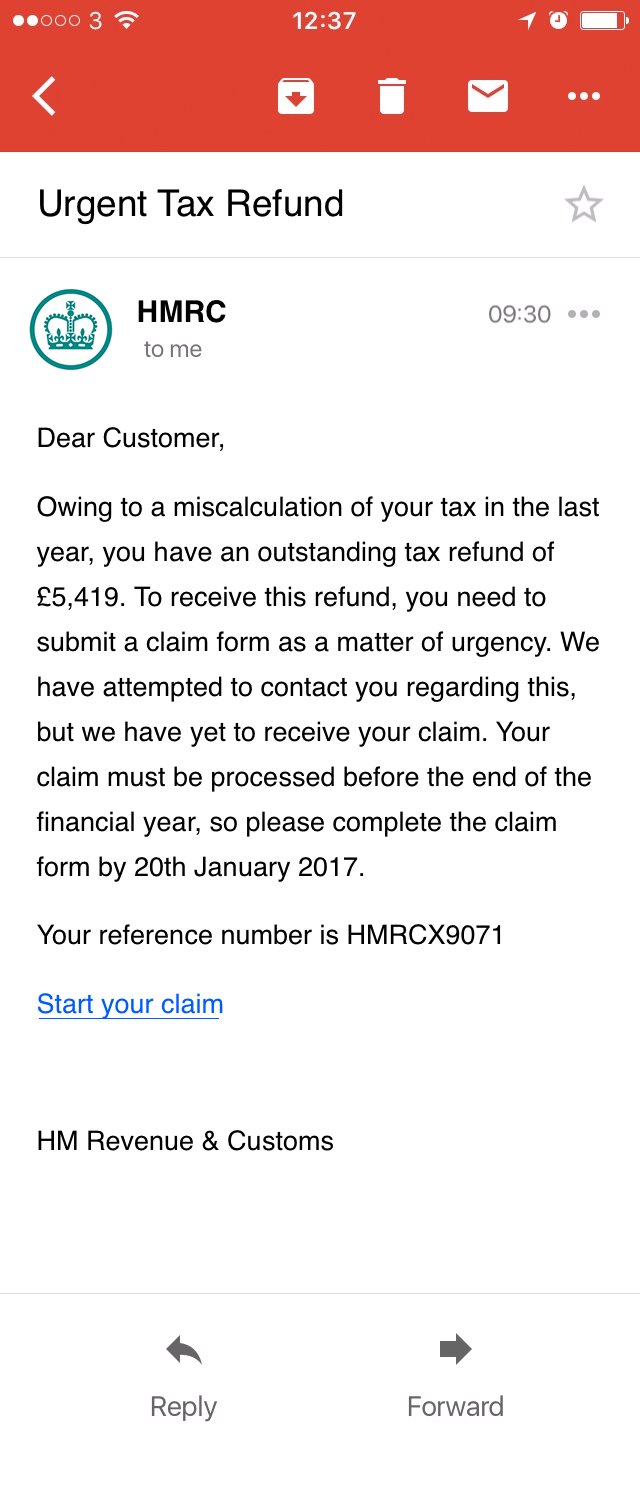
This is a scam
HMRC will never send notifications of a tax rebate via email
HMRC will never ask for your personal or financial information via email, or email you a link to a log-in page asking for this information
The email address is on a list of scam email addresses already known to HMRC
The use of a generic greeting like ‘Dear Customer’, rather than your name, is also a feature of many scams.
Tip: Never disclose personal or financial information on a website you’ve reached by clicking on a link in an email. If you’re in any doubt about who the email is from, do not click on any links in it.
2. Is this a scam?

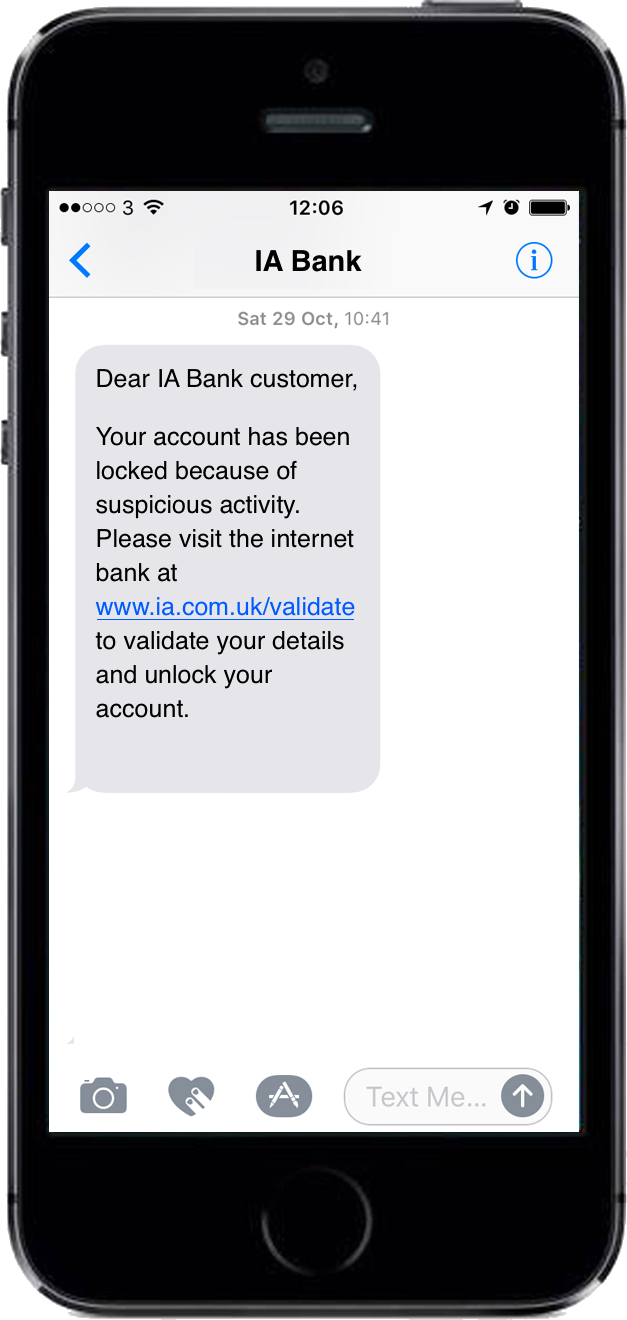
This is a scam
Banks won’t ask you to confirm personal or financial information via a text, or via a link from a text
Banks won’t text you a link to their internet banking log in page, or another page asking for personal details
Tip: Never disclose personal or financial information on a website you’ve reached by clicking on a link in a text message. Some scam messages may also contain a number you should ring rather than a link. Don’t ring this or the number the text message has been sent from – always look up your bank’s number yourself. Sometimes, scammers may tell you they need to transfer your money to a different account in your name, because of fraud on your account – banks will never get you to transfer money in this way.
3. Is this a scam?

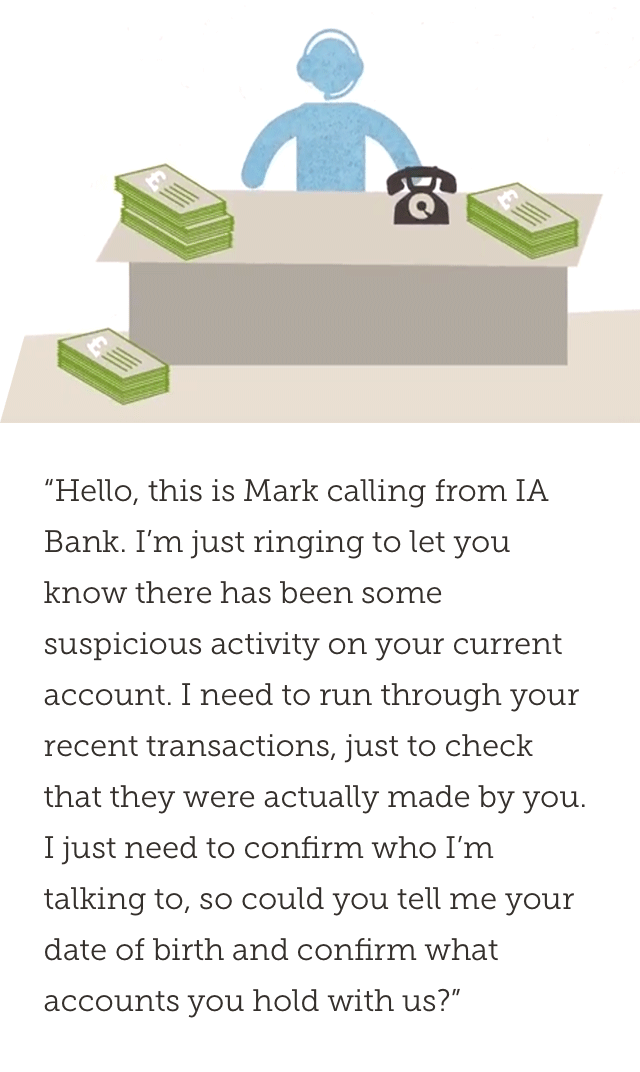
This is not a scam
This is a genuine call of the type banks make when they suspect fraud on your account. They may even use automated voice calls or text alerts to do this. However, be aware of your own bank’s policies and the types of security question they say they will ask you. Banks will usually explain how they will communicate with you on their website, or call or visit them to ask for this information.
Tip: If you’re suspicious about what you’re being asked in a phone call, you could always ring off, double check their number and call them back, or go into a branch instead. Banks won’t ask you for your account number or PIN when making this type of call.
4. Is this a scam?

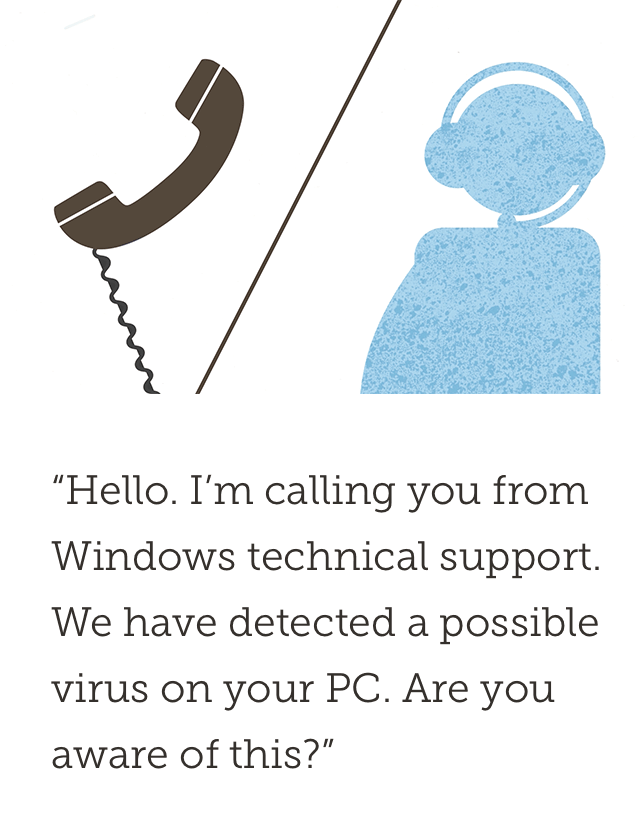
This is a scam
Microsoft won’t make unsolicited calls to tell you there’s a problem with your computer.
Tip: If you get a phone call claiming to be from any sort of computer technical support organisation, hang up. Scammers use phone directories to find out your details, so they may know your name and correctly guess what type of computer you’re using – this doesn’t mean they’re legitimate.
5. Is this a scam?

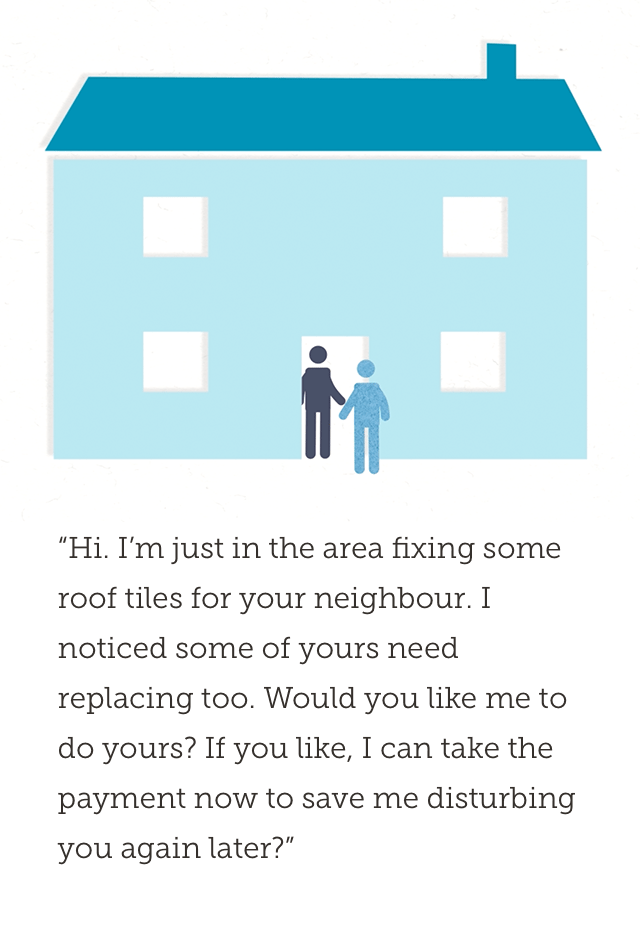
This is a scam
Scammers may come to your door offering to complete services and asking for payment up front. They then disappear without completing the service or provide a sub-standard service.
Tip: Don’t pay up front for services or goods offered at the door. Get personal recommendations for services like home maintenance, gardening or window cleaning, or find a reputable tradesperson using Trustmark. Make sure you get a few estimates to compare prices and avoid being overcharged, and get a written quote before employing someone.
6. Is this a scam?

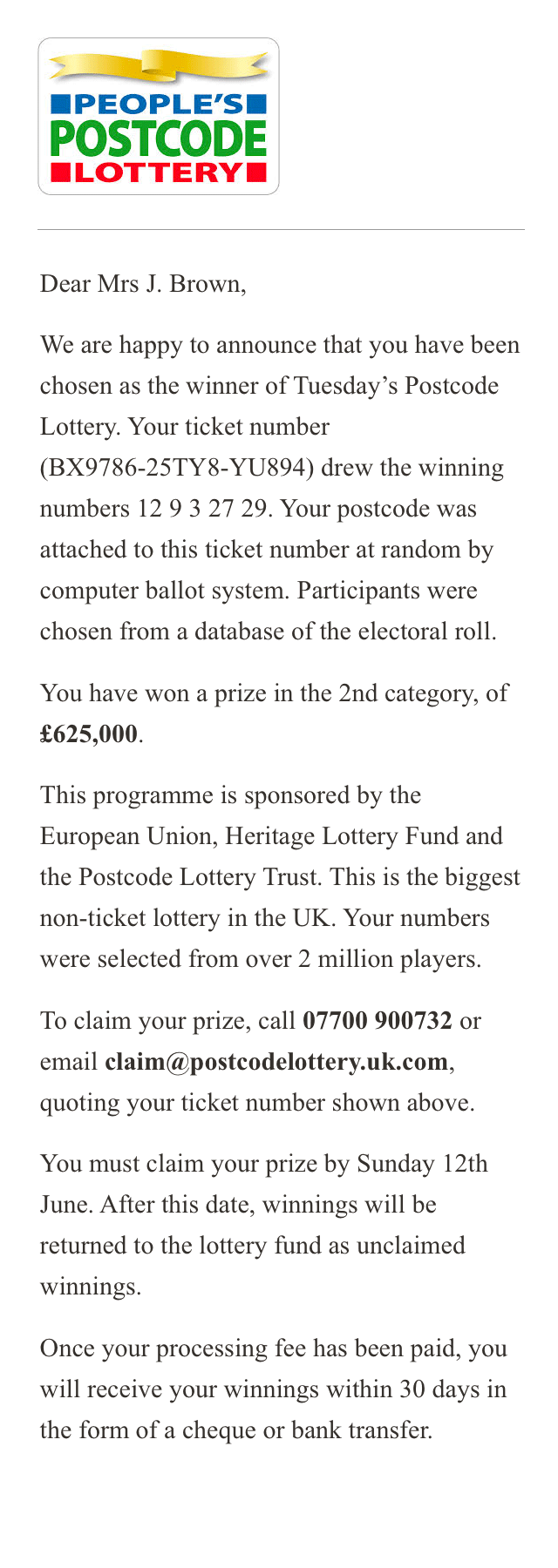
This is a scam
If you haven’t entered a lottery, you can’t have won
You shouldn’t be asked for an upfront fee to claim a prize
The statement telling you to act urgently to claim your winnings is a key feature of many scams. Tight deadlines are designed to pile on the pressure and stop you from thinking clearly.
Tip: Treat any communication asking you to pay a fee in advance with suspicion.
7. Is this a scam?

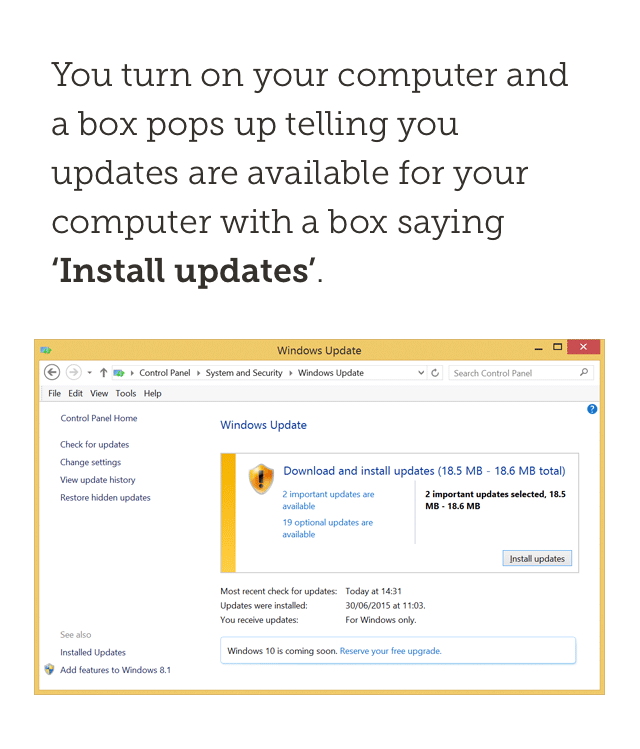
This is not a scam
This is a genuine message of the type most computers will generate when you need to update your software or operating system. However, fake software updates do exist and could install damaging software on your computer if you download them. Update notifications won’t come to you in an email link and be suspicious of notifications that pop up when you’re just browsing the internet rather than coming from the software itself.
Tip: Don’t avoid keeping your computer up-to-date because you’re worried that update notifications could be fake. Updates are important because they will contain the latest security fixes and should help keep your computer safe. If you’re updating software, go to the software website and download it from there, rather than clicking on a pop-up. Don’t click on an email link to update software. Make sure you also have anti-virus software installed.
8. Is this a scam?

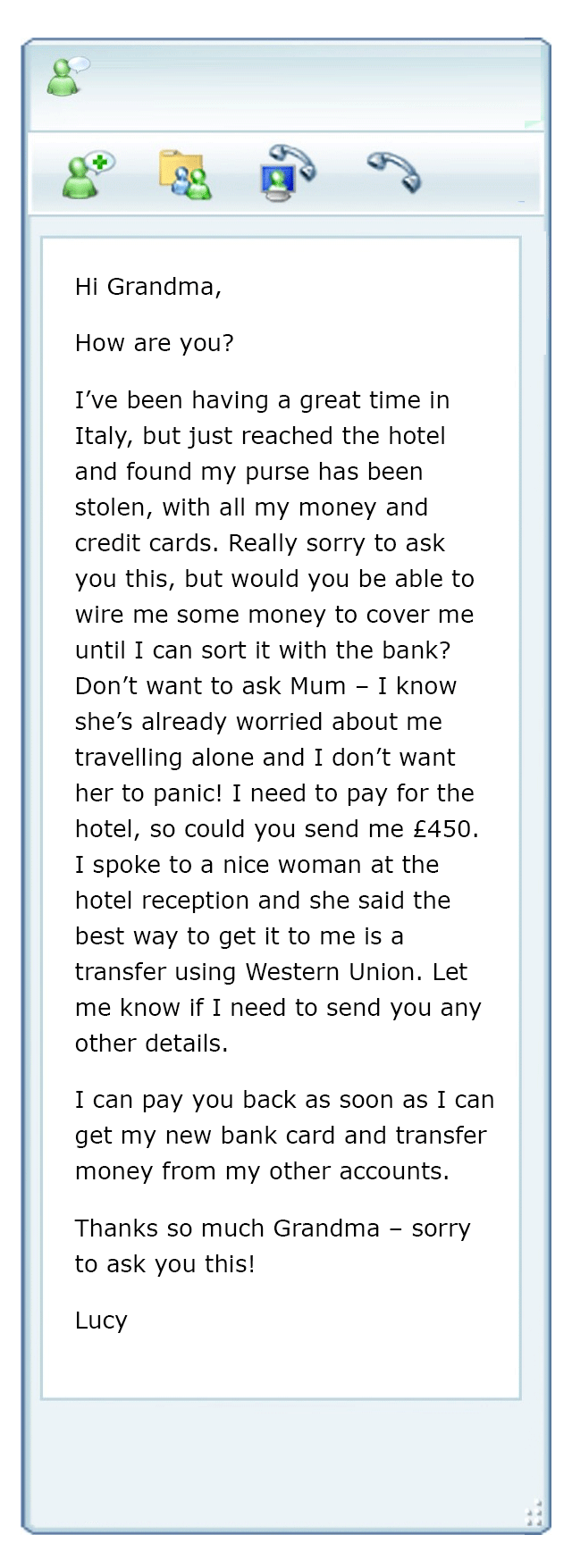
This is a scam
The scammers have hacked into the email or social media account of a family member. They describe a fake emergency and ask you to send money. As they have access to messages your relative has sent, they can find out details like whether she is on holiday and where. Scammers will usually send a message to everyone in a person’s contact list, so if you speak to other family members you’d probably find they’d received the same message.
Tip: If you receive a message like this, seemingly from a friend or relative, try to verify the story in another way. Don’t reply to the message, as you can’t know whether you’re talking to your relative or the scammer. Try calling your relative, and speak to other friends and family to see if they have received exactly the same message.
9. Is this a scam?

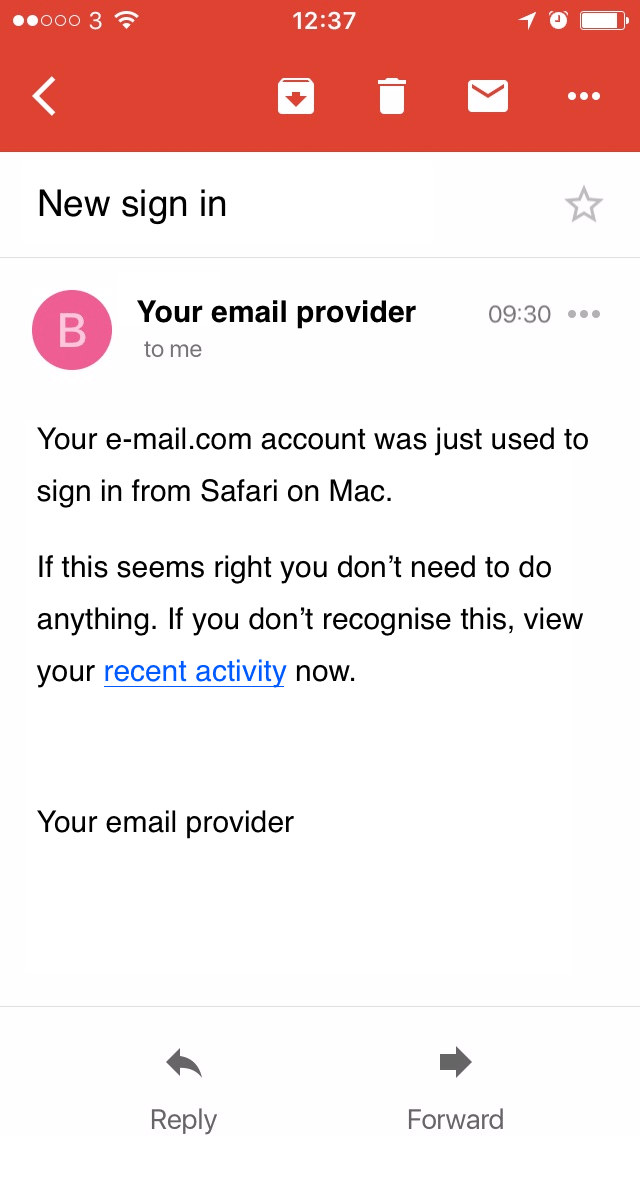
This is not a scam
This is a genuine email of the type email providers or other companies send you for security purposes to let you know when someone has logged into, or changed details in, your account. Most of the time this will be you, but it can alert you if someone else is trying to access your account.
10. Is this a scam?


This is a scam
Banks or the police will never ask for your PIN or send someone to your house to pick up your bank card. The scammers have used various tricks to make you think the call is genuine. When you ended the call and dialled the number on the back of the card, the scammer stayed on the line, making you think you had rung the bank when you were actually still talking to the scammer. You might also think your bank card is unusable if you’ve cut through it, but it’s possible for scammers to tape it back together or take an intact chip from a cut card and use it in a new one.
Tip: Never give out your PIN or give your card to someone who comes to the door. Your bank or the police will never ask you to do either of these things. If you’re ringing your bank to check a phone call claiming to be from them, be aware that scammers can stay on the line rather than hanging up the phone. Ring a number you trust first to make sure the line is clear, or use a different phone to call your bank.
10 Congratulations
You beat the scammers, but don't forget to keep your wits about you.
7–9 Well done
You’re pretty good at spotting a scam. Just don't let your guard down.
4–6 Not bad
It can be tricky to tell a scam from a genuine communication. It pays to play it safe.
0–3 Oh dear
The scammers beat you this time. Take some time to read through the advice available.
For more tips on spotting scams and staying safe, take a look at our guide Scamwise